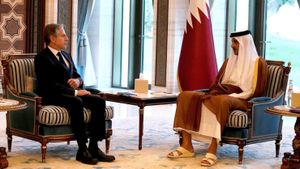Pakistan's political and international relations are facing unprecedented challenges as rapid shifts occur both domestically and regionally. Amid growing territorial tensions and changing alliances, the Pakistani government is grappling with the repercussions of recent U.S. policy decisions and the deteriorated state of its internal politics.
Breaking news this week indicated suspension of U.S. development assistance, which sparked significant concern among aid organizations reliant on these funds. Khurram Schehzad, the adviser to Prime Minister Shehbaz Sharif on economic affairs, addressed the situation, stating on Tuesday, "Firstly, the aid has been temporarily halted, and secondly, the aid has been halted for all countries, not just Pakistan, and thirdly, it is very small portion of the overall grants"—an attempt to downplay potential adverse effects. This stance met with skepticism from humanitarian organizations warning of drastic cuts to programs providing food, shelter, and health care if this freeze extends.
Over the years, the U.S. has historically provided over $32 billion directly to Pakistan, rooted largely in efforts to stabilize the region. The latest freeze affects numerous initiatives, particularly those supporting governance, education, and public health, which have long been deemed instrumental for the country's development. Schehzad noted, "Total grants for fiscal year 2025 were hardly 1 percent of total external financing," attempting to present reassurance amid sources indicating aid cuts could lead to chaos within key organizations affiliated with USAID.
Simultaneously, the political fabric within Pakistan is under strain following the Pakistan Tehreek-e-Insaf (PTI) party's outright rejection of Prime Minister Sharif’s invitation to renew talks aimed at resolving their disputes. The PTI, led by the jailed former prime minister Imran Khan, has expressed insistence on the release of political prisoners and the formation of judicial commissions to examine circumstances surrounding Khan's 2023 arrest. These talks broke down after Sharif's recent proposal failed to appease the party, according to Omar Ayub Khan, PTI’s leader of the opposition, who insisted their demands must be met for discussions to proceed.
For the last year, Khan's party members have consistently staged protests, some of which have escalated to violence, as frustration brews among supporters who perceive the political maneuvers against their leader as unjust. Reports detailing the protests showcase the political volatility permeated by the return of Khan's party pushing back against actions viewed as government oppression. "If they had come to us by 12 last night... we are still ready because problems are only solved at the negotiating table," asserted Rana Sanaullah, Pakistan's federal minister.
On the international front, regional tensions continue to redefine alliances, particularly as India strategically strengthens relationships with Afghanistan's Taliban regime. A historical rivalry exists between India and Pakistan, and with India's recent moves showcasing engagement with the Taliban, there is speculation of shifting balances of power. Diplomatic efforts include discussions such as the leveraging of India’s $370 million development aid for the Chabahar port, viewed as pivotal for trade throughout South Asia.
Amena Mohsin, a professor from Dhaka University, aptly summarized the situation with the observation: "The enemy of my enemy is my friend," highlighting how quickly alliances can realign based on mutual interests, often overshadowing previous hostilities.
The geopolitical chessboard is complicated as Pakistan attempts to mend relations with Bangladesh. Old wounds are being revisited and some observers note there is potential for renewed collaboration. A historic cargo ship arrived from Pakistan to Bangladesh for the first time since their divide, signifying possible thawing ties—though fraught with caution due to the legacy of former conflicts. Pakistani Premier Shehbaz Sharif recently engaged with Bangladesh’s interim leader, aiming to dispel remnants of animosity left from the tumultuous past.
Overall, Pakistan’s interactions with neighboring countries and its internal political strife create a complex web of challenges with long-lasting repercussions. Economic aid cuts could jeopardize humanitarian efforts, the political fight for legitimacy continues amid widespread unrest, and shifting alliances risk unforeseen consequences on Pakistan's stature within the region.
With each day, the stakes rise for both Pakistan and its leadership, setting the stage for potential upheaval rooted as much in historical rivalries as current socio-political dynamics. The future will require deft navigation of both domestic and foreign challenges to elicit stability and prosperity. The road seems fraught, yet the negotiations, shifting balances, and assertions of power continue to redefine what Pakistan stands for on the world stage.



